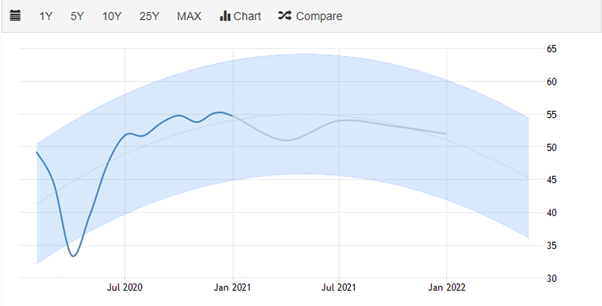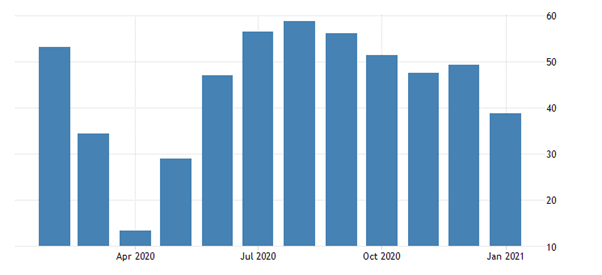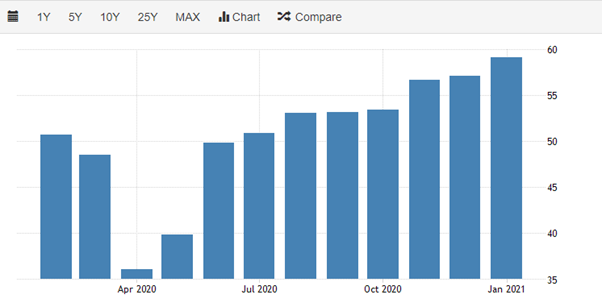Manufacturing PMI breakdown
Please login to join discussion
EU PMI Activity
The eurozone flash composite Purchasing Managing index for the month of January came In worse than economists had been expecting, with a reading of 47.5. The headline number marked another month of contraction and was notably down from December’s 49.1 final reading.
According to data inside the report the entertainment and hospitality sectors were hit hard due to the ongoing series of COVID-19 lockdowns across the eurozone. The manufacturing sector remained a bright spot for the EU economy, as factories remained busy and were allowed to open.
This was evident in the preliminary January eurozone Manufacturing PMI reading, as the headline number outpaced market expectations with a 54.7 reading. Germany and France, the growth engines of the eurozone continued to post robust PMI Manufacturing numbers.


The German Manufacturing PMI headline reading came in at 57.0, while the French Manufacturing PMI beat expectation with a 51.5 reading. The Service sector PMI reading for the entire eurozone beat expectations, but still remained in contraction with a 45.0 headline reading.
Traders and investors reacted negatively to the worsening flash PMI number for the eurozone and sold stocks. The German DAX, CAC40, ITA40, and ESP35 all sold-off after the PMI’s were released.


Worsening sentiment towards Italy was also to blame, as reports suggested that Italian Prime Minister was being tempted to hold a new election. Italian bond yields have notably risen today in response.
UK PMI Activity
The British pound currency and the FTSE100 index sold-off sharply this morning after the United Kingdom Services PMI reading for January came in at 38.8, which was far below market expectations.
Markets are all too aware that the services sector is the lifeblood of the UK economy, with traders quickly selling the British pound against a basket of top currencies and shorting UK stocks in response to the weak number. UK manufacturing activity also came in weaker-than-expected, however, it remained above 50, marking expansion.


Prior to the release of the negative services print the UK government had been speculating about closing of its border to other countries. Sentiment was therefore extremely fragile prior to today PMI data dump from the UK economy. Sterling has not been able to regain the 1.3700 handle and looks primed for further weakness.
US PMI Activity
The United States Purchasing Managers Index reading for the month of January came in far better than most economist had been predicting. The headline number came in at 59.1, which was also stronger than the previous month 57.1 reading.
January’s US Services PMI also beat market expectation with a red hot 57.5 headline reading. This was a surprise to many analysts considering that big cities such New York and California have been in lockdown.


IHS market remarked “Output growth accelerated in January to the second-fastest in almost six years, and business optimism about the year ahead surged higher. Over the past three months, business sentiment has been running at its highest since the start of 2015”.
The market reaction was muted, with the US dollar remaining under pressure against the euro currency, while US indices failed to rally. Gold and silver both remained under pressure and continued to nurse losses intraday.
© 2020 YouTrading UK - Leaders in Trader Training.
| Cookie | Duration | Description |
|---|---|---|
| __cfduid | 1 month | The cookie is used by cdn services like CloudFare to identify individual clients behind a shared IP address and apply security settings on a per-client basis. It does not correspond to any user ID in the web application and does not store any personally identifiable information. |
| _wpfuuid | 11 years | This cookie is used by the WPForms WordPress plugin. The cookie is used to allows the paid version of the plugin to connect entries by the same user and is used for some additional features like the Form Abandonment addon. |
| cf_use_ob | This cookie is set by the provider Cloudflare content delivery network. This cookie is used for determining whether it should continue serving "Always Online" until the cookie expires. | |
| cookielawinfo-checbox-analytics | 11 months | This cookie is set by GDPR Cookie Consent plugin. The cookie is used to store the user consent for the cookies in the category "Analytics". |
| cookielawinfo-checbox-functional | 11 months | The cookie is set by GDPR cookie consent to record the user consent for the cookies in the category "Functional". |
| cookielawinfo-checbox-others | 11 months | This cookie is set by GDPR Cookie Consent plugin. The cookie is used to store the user consent for the cookies in the category "Other. |
| cookielawinfo-checkbox-advertisement | 1 year | The cookie is set by GDPR cookie consent to record the user consent for the cookies in the category "Advertisement". |
| cookielawinfo-checkbox-necessary | 11 months | This cookie is set by GDPR Cookie Consent plugin. The cookies is used to store the user consent for the cookies in the category "Necessary". |
| cookielawinfo-checkbox-performance | 11 months | This cookie is set by GDPR Cookie Consent plugin. The cookie is used to store the user consent for the cookies in the category "Performance". |
| viewed_cookie_policy | 11 months | The cookie is set by the GDPR Cookie Consent plugin and is used to store whether or not user has consented to the use of cookies. It does not store any personal data. |
| Cookie | Duration | Description |
|---|---|---|
| YSC | session | This cookies is set by Youtube and is used to track the views of embedded videos. |
| Cookie | Duration | Description |
|---|---|---|
| _ga | 2 years | This cookie is installed by Google Analytics. The cookie is used to calculate visitor, session, campaign data and keep track of site usage for the site's analytics report. The cookies store information anonymously and assign a randomly generated number to identify unique visitors. |
| _gid | 1 day | This cookie is installed by Google Analytics. The cookie is used to store information of how visitors use a website and helps in creating an analytics report of how the website is doing. The data collected including the number visitors, the source where they have come from, and the pages visted in an anonymous form. |
| Cookie | Duration | Description |
|---|---|---|
| _fbp | 3 months | This cookie is set by Facebook to deliver advertisement when they are on Facebook or a digital platform powered by Facebook advertising after visiting this website. |
| fr | 3 months | The cookie is set by Facebook to show relevant advertisments to the users and measure and improve the advertisements. The cookie also tracks the behavior of the user across the web on sites that have Facebook pixel or Facebook social plugin. |
| IDE | 1 year 24 days | Used by Google DoubleClick and stores information about how the user uses the website and any other advertisement before visiting the website. This is used to present users with ads that are relevant to them according to the user profile. |
| test_cookie | 15 minutes | This cookie is set by doubleclick.net. The purpose of the cookie is to determine if the user's browser supports cookies. |
| VISITOR_INFO1_LIVE | 5 months 27 days | This cookie is set by Youtube. Used to track the information of the embedded YouTube videos on a website. |
| Cookie | Duration | Description |
|---|---|---|
| _gat_UA-42160853-2 | 1 minute | No description |
| cf_ob_info | No description | |
| CONSENT | 16 years 8 months 3 days 6 hours 2 minutes | No description |